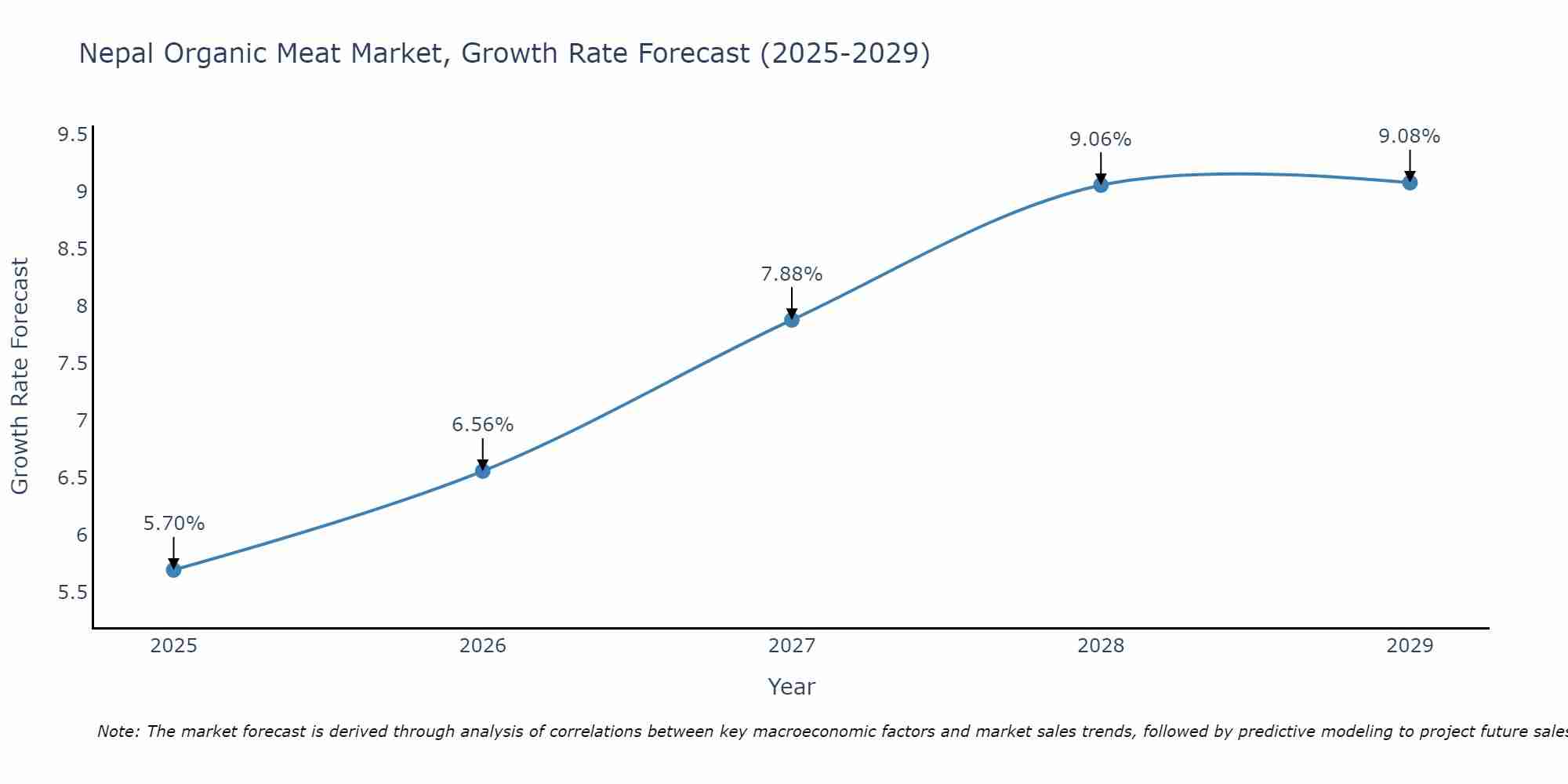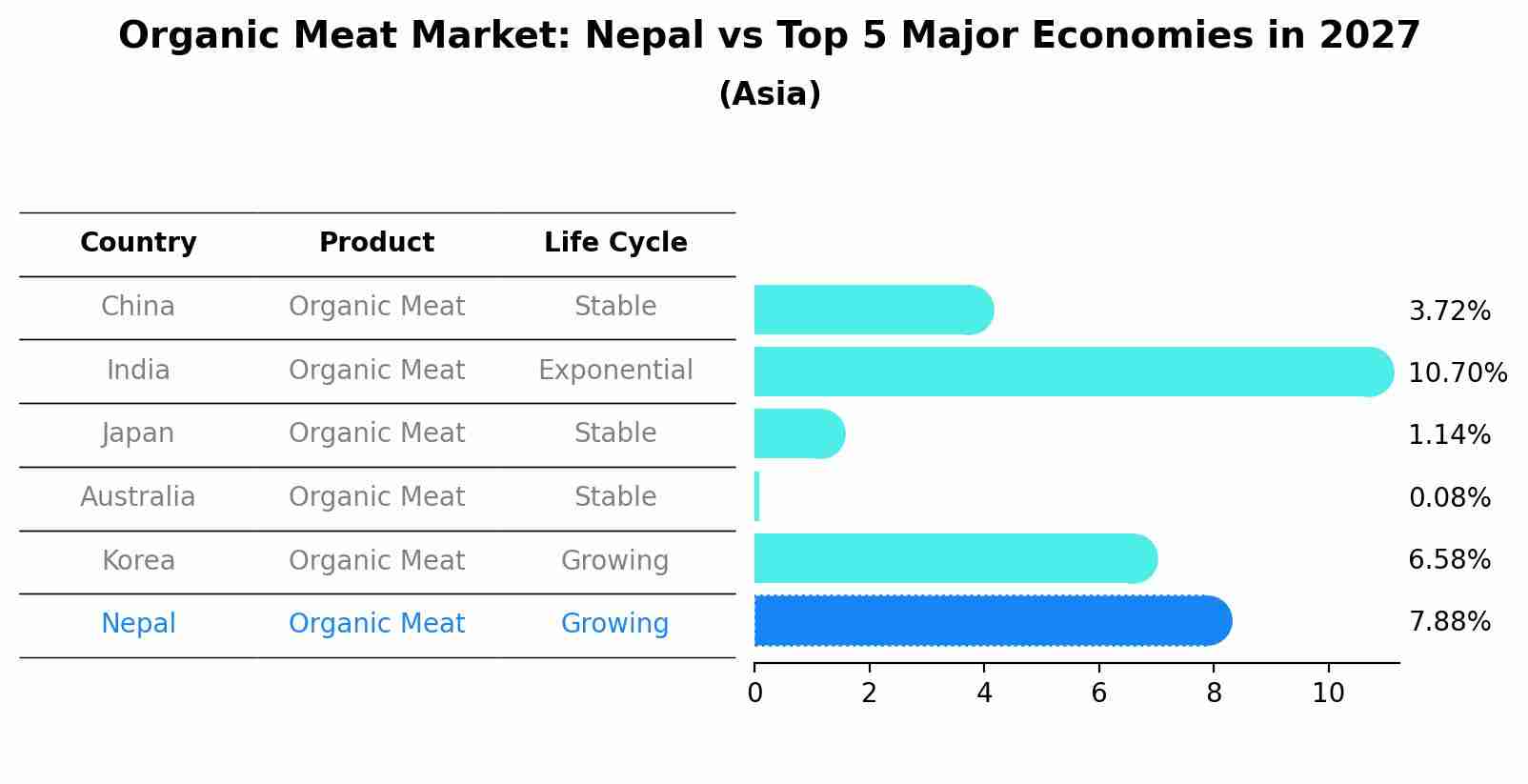Nepal Organic Meat Market (2025-2031) Outlook | Size, Value, Trends, Analysis, Revenue, Industry, Forecast, Share, Growth & Companies
| Product Code: ETC383616 | Publication Date: Aug 2022 | Updated Date: Jul 2025 | Product Type: Market Research Report | |
| Publisher: 6Wresearch | Author: Vasudha | No. of Pages: 75 | No. of Figures: 35 | No. of Tables: 20 |
Nepal Organic Meat Market Size Growth Rate
The Nepal Organic Meat Market is poised for steady growth rate improvements from 2025 to 2029. The growth rate starts at 5.70% in 2025 and reaches 9.08% by 2029.

Organic Meat Market: Nepal vs Top 5 Major Economies in 2027 (Asia)
The Organic Meat market in Nepal is projected to grow at a growing growth rate of 7.88% by 2027, highlighting the country's increasing focus on advanced technologies within the Asia region, where China holds the dominant position, followed closely by India, Japan, Australia and South Korea, shaping overall regional demand.

Nepal Organic Meat Market Synopsis
The Nepal Organic Meat Market is experiencing steady growth driven by increasing consumer awareness about the health benefits of organic meat products. Consumers are becoming more conscious about the quality of meat they consume, leading to a shift towards organic options that are free from antibiotics, hormones, and other harmful additives. The market is also benefiting from a rising preference for ethically sourced and environmentally sustainable food products. Local farmers and producers are responding to this demand by expanding their organic meat offerings and obtaining organic certifications to meet stringent quality standards. Despite facing challenges such as higher production costs and limited distribution channels, the Nepal Organic Meat Market is poised for further expansion as consumers prioritize health and sustainability in their food choices.
Nepal Organic Meat Market Trends
The Nepal Organic Meat Market is experiencing a growing demand for organic and ethically sourced meat products. Consumers are increasingly seeking transparency in the production process, focusing on animal welfare, and sustainable farming practices. This trend is driven by a rising awareness of the health and environmental benefits of organic meat, as well as a desire to support local farmers and reduce the carbon footprint associated with conventional meat production. As a result, there is a noticeable shift towards organic meat options in grocery stores, restaurants, and online platforms in Nepal. Producers and retailers are responding to this trend by expanding their organic meat offerings and obtaining certifications to assure consumers of the quality and authenticity of their products.
Nepal Organic Meat Market Challenges
In the Nepal Organic Meat Market, there are several challenges that hinder its growth and development. One major challenge is the lack of awareness and education among consumers regarding the benefits of organic meat, leading to a lower demand compared to conventional meat products. Additionally, the high production costs associated with organic farming practices, such as feed and certification expenses, can make organic meat products more expensive for consumers, further limiting market penetration. Infrastructure limitations, including inadequate cold storage facilities and transportation networks, also pose challenges in maintaining the quality and freshness of organic meat products. Furthermore, the limited availability of certified organic livestock and the need for more stringent regulations and certifications to ensure authenticity and quality are additional hurdles that need to be addressed in order to stimulate growth in the Nepal Organic Meat Market.
Nepal Organic Meat Market Investment Opportunities
The Nepal Organic Meat Market presents promising investment opportunities due to the increasing demand for high-quality, chemical-free meat products among health-conscious consumers. Investing in organic meat production facilities, distribution networks, and marketing strategies can offer significant returns in this growing market. Furthermore, there is a rising trend towards sustainable and environmentally friendly practices in agriculture, making organic meat production a lucrative sector for investment. Collaborating with local farmers to promote organic farming practices and ensuring high standards of animal welfare can differentiate a company in the market and attract a niche customer base. Overall, the Nepal Organic Meat Market provides a unique opportunity for investors to capitalize on the growing demand for organic, ethically sourced meat products in the region.
Jordan Agar Market Government Policies
The Nepal government has been promoting organic meat production through various policies and initiatives. The government has introduced programs to support organic farming practices, including providing subsidies for organic certification and training for farmers. In addition, there are regulations in place to ensure the quality and safety of organic meat products, such as guidelines for organic farming practices and standards for labeling organic products. The government has also been promoting organic meat through marketing campaigns and awareness programs to educate consumers about the benefits of organic products. Overall, the government`s policies aim to encourage the growth of the organic meat market in Nepal by supporting producers and ensuring consumer trust in organic products.
Nepal Organic Meat Market Future Outlook
The future outlook for the Nepal Organic Meat Market is promising as consumer awareness and demand for organic and ethically sourced meat products continue to rise. The market is expected to see steady growth driven by increasing health consciousness among consumers, concerns about food safety, and a growing preference for sustainable and environmentally friendly products. Additionally, government initiatives to promote organic farming and livestock practices are likely to further boost the market. As consumers become more educated about the benefits of organic meat, we can expect to see a shift towards organic meat products in Nepal, presenting opportunities for both domestic producers and retailers to capitalize on this growing trend.
Key Highlights of the Report:
- Nepal Organic Meat Market Outlook
- Market Size of Nepal Organic Meat Market, 2024
- Forecast of Nepal Organic Meat Market, 2031
- Historical Data and Forecast of Nepal Organic Meat Revenues & Volume for the Period 2021 - 2031
- Nepal Organic Meat Market Trend Evolution
- Nepal Organic Meat Market Drivers and Challenges
- Nepal Organic Meat Price Trends
- Nepal Organic Meat Porter's Five Forces
- Nepal Organic Meat Industry Life Cycle
- Historical Data and Forecast of Nepal Organic Meat Market Revenues & Volume By Type for the Period 2021 - 2031
- Historical Data and Forecast of Nepal Organic Meat Market Revenues & Volume By Poultry for the Period 2021 - 2031
- Historical Data and Forecast of Nepal Organic Meat Market Revenues & Volume By Beef for the Period 2021 - 2031
- Historical Data and Forecast of Nepal Organic Meat Market Revenues & Volume By Pork for the Period 2021 - 2031
- Historical Data and Forecast of Nepal Organic Meat Market Revenues & Volume By Others for the Period 2021 - 2031
- Historical Data and Forecast of Nepal Organic Meat Market Revenues & Volume By Application for the Period 2021 - 2031
- Historical Data and Forecast of Nepal Organic Meat Market Revenues & Volume By Food Services for the Period 2021 - 2031
- Historical Data and Forecast of Nepal Organic Meat Market Revenues & Volume By Retail for the Period 2021 - 2031
- Historical Data and Forecast of Nepal Organic Meat Market Revenues & Volume By Distribution Channel for the Period 2021 - 2031
- Historical Data and Forecast of Nepal Organic Meat Market Revenues & Volume By B2C for the Period 2021 - 2031
- Historical Data and Forecast of Nepal Organic Meat Market Revenues & Volume By B2B for the Period 2021 - 2031
- Nepal Organic Meat Import Export Trade Statistics
- Market Opportunity Assessment By Type
- Market Opportunity Assessment By Application
- Market Opportunity Assessment By Distribution Channel
- Nepal Organic Meat Top Companies Market Share
- Nepal Organic Meat Competitive Benchmarking By Technical and Operational Parameters
- Nepal Organic Meat Company Profiles
- Nepal Organic Meat Key Strategic Recommendations
Frequently Asked Questions About the Market Study (FAQs):
- Single User License$ 1,995
- Department License$ 2,400
- Site License$ 3,120
- Global License$ 3,795
Search
Thought Leadership and Analyst Meet
Our Clients
Related Reports
- Afghanistan Apparel Market (2026-2032) | Growth, Outlook, Industry, Segmentation, Forecast, Size, Companies, Trends, Value, Share, Analysis & Revenue
- Canada Oil and Gas Market (2026-2032) | Share, Segmentation, Value, Industry, Trends, Forecast, Analysis, Size & Revenue, Growth, Competitive Landscape, Outlook, Companies
- Germany Breakfast Food Market (2026-2032) | Industry, Share, Growth, Size, Companies, Value, Analysis, Revenue, Trends, Forecast & Outlook
- Australia Briquette Market (2025-2031) | Growth, Size, Revenue, Forecast, Analysis, Trends, Value, Share, Industry & Companies
- Vietnam System Integrator Market (2025-2031) | Size, Companies, Analysis, Industry, Value, Forecast, Growth, Trends, Revenue & Share
- ASEAN and Thailand Brain Health Supplements Market (2025-2031) | Strategy, Consumer Insights, Analysis, Investment Trends, Opportunities, Growth, Size, Share, Industry, Revenue, Segments, Value, Segmentation, Supply, Forecast, Restraints, Outlook, Competition, Drivers, Trends, Demand, Pricing Analysis, Competitive, Strategic Insights, Companies, Challenges
- ASEAN Bearings Market (2025-2031) | Strategy, Consumer Insights, Analysis, Investment Trends, Opportunities, Growth, Size, Share, Industry, Revenue, Segments, Value, Segmentation, Supply, Forecast, Restraints, Outlook, Competition, Drivers, Trends, Demand, Pricing Analysis, Competitive, Strategic Insights, Companies, Challenges
- Europe Flooring Market (2025-2031) | Outlook, Share, Industry, Trends, Forecast, Companies, Revenue, Size, Analysis, Growth & Value
- Saudi Arabia Manlift Market (2025-2031) | Outlook, Size, Growth, Trends, Companies, Industry, Revenue, Value, Share, Forecast & Analysis
- Uganda Excavator, Crane, and Wheel Loaders Market (2025-2031) | Strategy, Consumer Insights, Analysis, Investment Trends, Opportunities, Growth, Size, Share, Industry, Revenue, Segments, Value, Segmentation, Supply, Forecast, Restraints, Outlook, Competition, Drivers, Trends, Demand, Pricing Analysis, Competitive, Strategic Insights, Companies, Challenges
Industry Events and Analyst Meet
Whitepaper
- Middle East & Africa Commercial Security Market Click here to view more.
- Middle East & Africa Fire Safety Systems & Equipment Market Click here to view more.
- GCC Drone Market Click here to view more.
- Middle East Lighting Fixture Market Click here to view more.
- GCC Physical & Perimeter Security Market Click here to view more.
6WResearch In News
- Doha a strategic location for EV manufacturing hub: IPA Qatar
- Demand for luxury TVs surging in the GCC, says Samsung
- Empowering Growth: The Thriving Journey of Bangladesh’s Cable Industry
- Demand for luxury TVs surging in the GCC, says Samsung
- Video call with a traditional healer? Once unthinkable, it’s now common in South Africa
- Intelligent Buildings To Smooth GCC’s Path To Net Zero


















